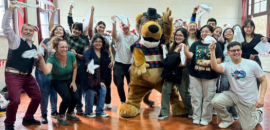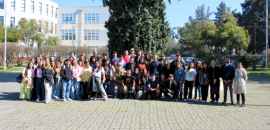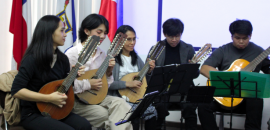You are here
Campus Strengthens Internationalization in the Areas of Teaching, Research and Outreach & Engagement

International cooperation; managing agreements and networks; academic and student mobility; along with the search and dissemination of opportunities are the main guidelines of the Department of International and Interinstitutional Relations (DRII, for its name in Spanish). Since 2007, the mission of this unit, dependent on the Vice Rectory of Outreach and Engagement, has been to strengthen, broaden and deepen the international connections of the university, as well as to promote initiatives to substantiate its internal and external internationalization.
The internationalization process is a a cross-sectional priority of our university, as is established in the Institutional Strategic Plan 2016-2020, reflected in the areas of teaching, research and outreach & engagement.
This is why the mission of the Department of International and Interinstitutional Relations (DRII, for its name in Spanish), created in 2007 and dependent on the Vice Rectory of Outreach and Engagement, has been to strengthen,broaden and deepen the international connections of the university, as well as to promote initiatives to realize its internal and external internationalization.
In this vein, its work focuses mainly on maintaining and developing policies for national and international student and academic mobility; supporting research with international participation; articulating and managing international and interinstitutional networks and consortia; seeking for and subscribing to bilateral and multilateral agreements; in addition to materializing international visits for international cooperation and research opportunities.
Anoek van den Berg, director of the Department, says that the unit is currently in the process of updating the institutional policy of internationalization.
"We are working jointly with the Council for Internationalization, which includes the participation of one delegate per academic unit and all the vice-rectors. We are generating strategic guidelines on the focal points of our mission: teaching, research and outreach & engagement. Each one has other focuses by geographical area and by discipline,” she comments.
Main Focuses
As part of the Student Mobility Program promoted by our university, on average, we have 300 incoming and about 150 outbound students every year. Outbound mobility has increased by 70% since 2014 and incoming mobility has increased 30% in the last 4 years.
We are visited by exchange student for one semester from Mexico and Spain, while our students mostly choose Brazil and Spain as destinations.
Some of the most important agreements that facilitate student mobility to high-level international and regional universities include the University of Calgary in Canada; the U. of Korea; Friedrich Alexander Universität Erlangen Nürnberg, Germany; U. Politécnica de Valencia, Spain; and U. Nacional de Colombia.
In the area of international research and cooperation, we highlight the agreements with Michigan State University, USA, Université de Montréal, Canada; Sciences Po, France; Technische Universität Dresden, Germany; Universitat Autónoma de Barcelona, Spain; and Carnegie Mellon University, USA.
Our university has agreements with 125 universities included in the top 500 universities worldwide, according to the QS ranking(2018). Over the last 10 years, 300 agreements have been signed or renewed and a number of alliances are in effect with 43 countries, focusing mainly on Europe and Latin America.
In this way, the university has an extensive network of strategic alliances, which are visible through the research projects in international cooperation. Of all our academics, 48% are currently participating as co-authors in highly regarded international publications.
Other important liaisons in extension, student and academic mobility and other international cooperation initiatives are also noteworthy. International networks such as the Grupo Montevideo Association of Universities (AUGM, for its name in Spanish), Consortium for North America Higher Education Collaboration (CONAHEC), Inter-American University Organization (OUI) and La Rábida, are some of them.
DRII also has projects that promote interculturality, such as USACH Sin Fronteras (USACH Without Borders), a program coordinated by students for students that strives to contribute to students’ intercultural stills development. The contribution of international experience within students’ curriculum is important for the graduate profile because it is vital to be able to stand out in the labor market for having acquired interpersonal and communication skills through contact with other cultures. At the same time, the unit works in collaboration with VRIDEI in promoting international cooperation in the area of research.
Author:
Soledad Fuentes Mansilla
Photograph:
Marco Avilés
News
 International students learn cueca with Usach Without Borders and Department of Cultures and Arts
International students learn cueca with Usach Without Borders and Department of Cultures and Arts
 Rector Vidal to join the Governing Board of UNESCO's International Institute for Higher Education
Rector Vidal to join the Governing Board of UNESCO's International Institute for Higher Education
 Students visited the Ambassador of Morocco to learn about the country's diplomatic work and culture
Students visited the Ambassador of Morocco to learn about the country's diplomatic work and culture



